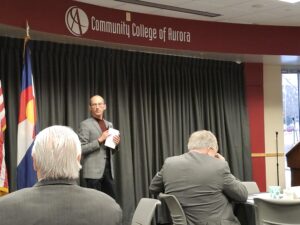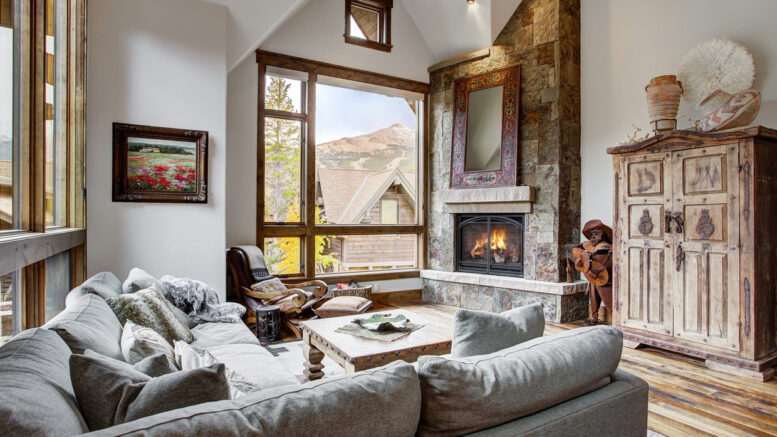While the Colorado Legislature is considering a host of bills this session that will impact businesses statewide, one measure — on short-term rentals — is drawing outsized backlash from mountain-town business leaders. And it is up for its first hearing on Tuesday.
Senate Bill 33, sponsored by Democratic Sen. Chris Hansen of Denver, would require owners of short-term rental property that lease their places for at least 90 days a year to pay commercial property tax rates rather than be taxed as residential property. That would represent a quadrupling of tax bills for most affected property owners and could lead to a mass exodus of such homes and condos from the short-term rental market for much of the year, according to surveys.
The driving forces behind the bill are mountain-town and -county elected officials, who argue that the boom in short-term rentals has pushed out opportunities for long-term rental housing for everyone from wait staff to teachers, exacerbating workforce shortages. Such properties also generate a higher volume of police calls and trash pickup, straining public services without bringing in the tax revenue expected of commercial properties, say Hansen and sponsoring Rep. Mike Weissman, D-Aurora.
But they also generate significant business for local restaurants, stores and bars, and such properties make up for the shortage of hotels in many skiing and hiking destinations, argue officials like Chris Romer, president/CEO of the Vail Valley Partnership. Opponents point also to a study from the Colorado Lodging and Resort Alliance positing that the decline in available rooms for rent, combined with reduction in guest visits if prices for remaining properties jump, could lead to an annual loss of $1.4 billion in tourism revenue.
Short-term rental proposal has generated significant reaction
Bill backers question the findings of a study from a group so closely aligned with short-term-rental owners, and Weissman recently told an Aurora Chamber of Commerce event that he expects significant changes in the bill before it reaches the House.
Meanwhile, Rep. Shannon Bird, D-Westminster, introduced what is essentially an alternate proposal, HB 1299, on Wednesday. That bill would reclassify short-term rentals as commercial property only if they are not the primary or secondary homes of the owner, allowing individuals to continue to rent both their property and a second home while paying residential tax rates on them before having to pay nonresidential rates for any home that is a third or greater in their portfolio.

Colorado state Rep. Mike Weissman speaks at a Jan. 4 Aurora Chamber of Commerce breakfast.
Still, the number of property owners and business and high-country leaders expected to pack the Senate Finance Committee for its 2 p.m. hearing on Tuesday is significant. And it represents the sharp divide on the issue between the people who live in and oversee the communities where a significant amount of housing stock is short-term rentals and the community businesses benefitting from the visitors who stay there.
“Every business owner in this valley who I’ve talked to is concerned,” Romer said. “This would decimate our spring, summer and fall tourism. And it impacts our restaurants and retail food providers.”
A booming short-term rental market
By CLARA’s count, there are 47,876 properties in Colorado being rented for 30 days or less at a time, roughly 60% which book for 90 or more days per year. Those properties — 75.7% of which the organization says are owned by state residents — pay the residential tax assessment rate of 7.15% rather than the 27.9% rate charged to hotels and other commercial properties.
While the Front Range has its share of short-term rental options, they are concentrated most heavily in mountain towns; Summit County Commissioner Tamara Pogue has said that one-third of the housing units in her county now are short-term rentals. That number has grown wildly in the past decade, both as more Coloradans have bought second homes and turned to renting to help pay mortgages and as some national companies and property owners have seen the monetary rewards in owning such a destination.
For the past five years, mountain towns have imposed more regulations on such properties, from licensing fees to caps on the number of local units to new taxes whose revenues often fund affordable housing. Since 2020, the state has granted counties more rights, including those of licensing and the ability to revoke such licenses, but SB 33 represents the largest effort yet toward state oversight of the sector.
The bill, if passed, would take effect in 2026, would exempt primary residences where the owner lives while leasing some rooms and would require county assessors to determine which properties are short-term rentals to ensure they are taxed appropriately.
“Tax fairness”

Colorado state Sen. Chris Hansen discusses a bill on the Senate floor during the 2023 session.
The Legislative Oversight Committee Concerning Tax Policy backed the bill by a 4-2 party-line vote in October after Hansen said it must respond to economic conditions, including a lack of workforce housing that is helping to cause labor shortages in the very industries that serve visitors in short-term rentals. The bill then gained a powerful ally in Democratic Gov. Jared Polis, who framed the issue to the Joint Budget Committee as one of placing all houses and all lodging facilities on equal footing by separating the two in terms of taxation.
“We support tax fairness for homeowners,” Polis told the committee in November. “(Short-term rentals) are being given a tax subsidy by being taxed at a residential rate despite being used as commercial properties.”
But sector leaders and mountain-town business officials say the solution proposed in SB 33 would collapse the market to which it intends to bring fairness. And that would lead to fewer overnight visitors to the towns, leading to layoffs or even closures of the restaurant and retail businesses that rely on them — all without boosting local housing supply.
Romer has said 70% of property owners would limit their properties to 89 days a year of rental or less — a number more conservative than the 89% rollback that CLARA found from surveys with property owners.
Potential ripple effects of legislation
If that supply were to be limited like that, Romer said, most rentals would come between Christmas and Spring Break when there is the highest demand for ski lodging, leaving towns hollowed out during other seasons. This would sap the coffers of local communities that rely on lodging income and visitors, and it would upend the business models of many “hotels” in the mountains that actually are collections of condominiums leased out by their individual unit owners.

Chris Romer is president/CEO of the Vail Valley Partnership.
The CLARA analysis predicted that Colorado would lose 2.6 million booked nights just from property owners taking their homes and condos off the market any more than 89 days annually. Additionally, the high prices that would come with the constrained supply of units would lead to another 500,000 to 1.1 million lost booked nights, producing between 3.9 million and 4.3 million fewer visitors when sizes of guest parties are considered.
Steven Frumess, general manager of Breckenridge-based rental and service-management company Alpine Edge, said that while weekend warriors from Denver likely would stomach higher-priced lodging for a short trip, the state could lose the higher-spending families who plan months in advance and come to stay for a week or more.
Meanwhile, bill proponents would be unlikely to achieve their goal of converting these spaces to long-term workforce housing, particularly as service-industry workers aren’t looking to rent the three-bedroom houses most likely to come off the market, he said. While that exodus of room nights would cost property owners revenue, they also would avoid the quadrupling of property taxes and would consider that an even break, leading to likely layoffs of professionals from property managers to cleaners to hot-tub technicians.
A massive impact or not?
Finally, both Frumess and Romer questioned the tax fairness that SB 33 proponents have claimed. Hotels tax assessments are based not on their overall sale-price value but on their income potential, while the bill sets up short-term rental properties to be priced according to their appraised value. That creates an uneven playing field, they said.
“I’m not a political person. I’m just scared for my livelihood,” Frumess said. “This is not just an STR issue. It’s a tourism issue.”
Weissman pointed to several studies that have been done on the short-term rental industry that question its value to local communities, particularly a 2019 paper on industry leader Airbnb from the Economic Policy Institute, a Washington D.C. think tank focused on lower-income workers and equity.
The study cited two surveys that found only 2% to 4% of Airbnb visitors said they would not have taken trips were such short-term rental lodging not available, questioning assertions that communities could lose large swaths of tourists if that lodging supply was limited. And it also noted studies that found Airbnb introduction and expansion in New York City may have raised average rents by nearly $400 for city residents because of the competition for fewer available long-term lodging units.
Short-term rental debate spreading statewide
To be sure, the issue that SB 33 seeks to address is not just one for the mountain communities.
Arapahoe County commissioners, for example, are studying the idea of regulating short-term rentals in unincorporated areas. At a Jan. 29 meeting, county officials presented them findings of a survey that showed that more than 60% of residents would support registration of short-term rentals, licensing fees and requirements that owners occupy the houses that contain the space they are renting out, while less than half or residents supported allowing for rentals of investment properties that are not owner-occupied.
The question, then, for legislators who have been permissive about local regulations of the rentals is whether a quadrupling of property-tax bills for owners of such units will thread the needle of supporting tourism while helping local governments — or whether it will tip too far to the side of obstruction.
The vote Tuesday on Hansen’s proposal — which he has floated before but had never brought forward in the face of intense opposition, including from many mountain-town legislators — will give great indication of whether commercial-property designation for these properties is the answer they seek.
